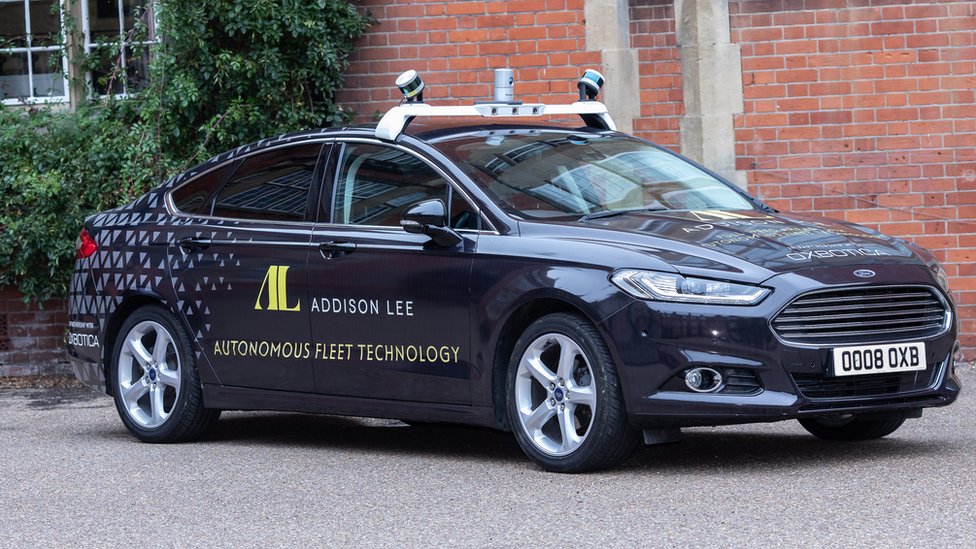Music
Trailers
DailyVideos
India
Pakistan
Afghanistan
Bangladesh
Srilanka
Nepal
Thailand
StockMarket
Business
Technology
Startup
Trending Videos
Coupons
Football
Search
Download App in Playstore
Download App
Best Collections
Technology


Would you trust a taxi with no driver
Taxi firm Addison Lee is betting its customers will be ready to, in London at least, in just three years' time.
It has joined forces with self-driving software specialist Oxbotica, and says the tie-up means it will offer self-driving taxis in the capital by 2021.
The move will pit it
- Details
- Category: Technology
Read more: Addison Lee plans self-driving taxis by 2021
Write comment (100 Comments)

A freelance photographer in the US has seen his search to find a mystery couple he snapped seemingly in the middle of a proposal go viral but has still not located the pair.
Matthew Dippel captured the moment on 6 October in Yosemite National Park in California while waiting to take a photograph of his friend Josh.
He
- Details
- Category: Technology
Read more: Yosemite: Photographer searches for Taft Point proposal couple
Write comment (99 Comments)

Millions of people around the world have watched a viral video that appears to show a woman taking direct action against "manspreading". So why do some think it is actually Kremlin-backed disinformation
A woman
- Details
- Category: Technology
Read more: Is 'manspreading' video a Kremlin hoax
Write comment (98 Comments)Addison Lee and Oxbotica ink self-driving deal, will offer autonomous car services in London by 2021
After undertaking a year-long investigation with Ford and four other mobility specialists on how to build self-driving systems that integrate with Londonexisting transport infrastructure, Addison Lee today is announcing the next step in its autonomous strategy.
The on-demand ride company — which competes with black cabs, Uber and other car services — announced a deal with self-driving startup Oxbotica to develop autonomous vehicles, with the aim of getting them in service in London by 2021.
No financial details are being revealed about the deal. Addison Lee CEO Andy Boland, in an interview, described it as &purely commercial.& Currently Addison Lee is &unfashionably profitable,& he added, and so it is working on its current self-driving efforts off its own balance sheet. It is also wholly owned by PE firm the Carlyle Group, so itlikely that this will help with future funding, although Boland did not rule out that when the company gets closer to a commercial launch, that it might need to look for funding to do this.
Meanwhile, Oxbotica — a spin-out from Oxford University — has raised around $18 million to date, with backers including Oxford, Innovate UK, the Ministry of Defence, the IP Group, insurers Axa XL and others.
The deal potentially sets up an interesting new avenue in how we might see autonomous cars being built, rolled out and operated.
Today, a number of transportation-on-demand companies that have roots in the tech world (Uber, Didi and Yandex Taxi are three examples) are trying to build their own self-driving tech. Alongside them, there are also a plethora of car makers who are also intent on building and running that experience.
Now, Addison Lee and Oxbotica are essentially presenting a third option: a system not built by the car service-operator, and not by a car maker, but by a third-party tech company that overlays the tech on top of whatever vehicle the service provider chooses to have.
Oxbotica was the first company to get a green light to start any kind of self-driving car test on a UK road, when it tested its equipment on a modified Renault driving five miles per hour in the town of Milton Keynes in 2016.
That early start was one of the reasons why Addison Lee decided to go with Oxbotica for its own efforts.
&The way they have built their technology and how they are already provisioning it has been impressive,& said Boland. &They have the most tangible capability that we could go with, and we felt that the way they were thinking about it, the business model isn&t just for ride share or car share, itacross a range of other industry applications, and we like that, too.Itnow getting serious, and real-life-scale operators like Addison Lee are looking to bring this to market.& That would include shuttle services but potentially other kinds of commercial transportation (note that Oxbotica counts a commercial insurer as a backer).
&This represents a huge leap towards bringing autonomous vehicles into mainstream use on the streets of London, and eventually in cities across the United Kingdom and beyond,& saidGraeme Smith, CEO of Oxbotica, in a statement. &Our partnership with Addison Lee Group represents another milestone for the commercial deployment of our integrated autonomous vehicle and fleet management software systems in complex urban transport conditions. Together, we are taking a major step in delivering the future of mobility.&
The two will start first with a comprehensive 3D mapping sweep before moving on to other aspects of building the service to prepare a autonomous vehicle service for trials.
For now Addison Lee has not named a vehicle partner, and Boland said that this was intentional.
The initial mapping exercise will be on the companyexisting fleet of vehicles working on autonomous research around London today & those will be the Fords from last yeardeal, he said. &But in terms of future service provision in 2021, that decision is yet to be made. Oxbotica is agnostic to manufacturers, and that was also interesting to us at the moment.&
Although Addison Lee competes with the likes of Uber — which had to appeal for a provisional 15-month right to operate in London after initially losing its license — it is different in that it owns its own fleet of vehicles. That has given the company more of an incentive to try to develop its own technology that it might use across whatever vehicles it chooses to use in its fleet. Itnot clear how this will work alongside the fact that many car makers are also working on their own autonomous technology and subsequent strategy to &own& the self-driving experience — at some point they might even directly conflict — but for now following this route could be Addison Leestrongest bet for continuing to keep a close service for its drivers and its fleet, developing it in the way it feels is best for its own business.
&Itabout having a bit more control between us,& Boland said of the deal with Oxbotica, & and creating and building those services together without the dependencies without the changing priorities of an OEM. So that we can do what we need to do.&
The self-driving car market is expected to be worth some £28 billion in the UK alone by 2035, and car services — versus private ownership — are shaping up to be a large part of how it might play out. Startups like FiveAI are also focusing on building self-driving car systems, specifically so that they can run in their own fleets of vehicles and in a service run by FiveAI: its reasoning is that autonomous vehicles will be too cost prohibitive to own for the majority of people.
As car ownership is predicted to decline as cars become ever-more sophisticated and expensive, car services are already on the rise and are predicted to grow some 21 per cent by 2030.
- Details
- Category: Technology
Wael Abbas, a human rights activist focused on police brutality in Egypt has been under arrest since May on charges of spreading fake news and &misusing social media.& Andy Hall, a labor rights researcher, has been fighting charges under Thailandcomputer crime laws because of a report published online that identified abuses of migrant workers.
You wouldn&t normally mention Egypt and Thailand in the same breath.But both countries underwent military coups within the last five years, and even among the many oppressive regimes in the world, they are going to extra lengths today to prosecute free speech.
Abbas and Hall are just two examples of hundreds of recent prosecutions.In 2017 alone, Egyptian security forces arrested at least 240 people based on online posts.Three years after the coup, Thai authorities had charged more than 105 people just for posting comments deemed offensive to the monarchy.
To be clear, neither country has ever been a bastion of free speech. Thailand has been ranked ¬ free& seven out of the eight years that political-rights nonprofit Freedom House has published its Freedom on the Net Report. Egyptscore has steadily declined since the height of the Arab Spring, going from &partly free& to ¬ free& in the last three years.
Sanja Kelly has been with Freedom House for 14 years and has headed its Internet Freedom division since 2010. She tells me that whatespecially alarming is the extent to which authorities in both Egypt and Thailand have gone to silence online dissent. Activists and dissidents may well anticipate persecution around the world, but today housewives, students and even tourists in Egypt and Thailand have become the target of prosecutions for as little as posting a video or responding to a private message on social media.
Overthe last five years both Egypt and Thailand have experienced an unprecedented crackdown on internet freedom. &In 2015, the Egyptian government blocked only two websites. Today, they are blocking over 500,& Kelly explained. &The situation in Egypt and Thailand is now among the most repressive in the world.&
Egypt
Since El-Sisi seized power in 2013 in a coup, the Egyptian government has taken drastic steps to clamp down online. In its latest move, the government enacted a law in September that makes any social media user with more than 5,000 followers subject to regulation as a publisher. So now in Egypt, if you have more than 5,000 Twitter followers, for example, you&re subject to the same regulations that the New York Times has on what it publishes.
It wasn&t always like this. Back in 2011, Facebook and Twitter were hailed as drivers behind the Arab Spring.The protests that resulted led to the toppling of Hosni Mubarak who had ruled the country for nearly 30 years. At their height, many journalists even started calling the protests the &Twitter uprising& and the &Facebook revolution.&
Kelly tells me that freedom on the internet in Egypt has been getting progressively worse since Sisi seized power. Even under Mubarak, the authorities were not as concerned with policing speech on the internet. But that has completely changed since 2013.
Kelly adds that the measures Egyptian authorities passed this year were intended to tighten their grip on social media and internet use even further. The result has been more and more Egyptians being arrested, with the authorities using a combination of laws to bring charges.
Thailand
Thailand has long been known for its strict application of its lèse majesté laws under which any criticism of the Thai king or his family can lead to years in jail. But since the 2014 military coup, the enforcement of these laws has gone into overdrive. The ruling military junta in Thailand has also beefed up computer crimes and defamation laws to make it all but impossible to express dissent online.
According to Human Rights Watch, since the coup in 2014, the junta has ramped uparrests under the 2007 Computer-Related Crime Act (CCA). Last year, the military amplified the 2007 law by providing grounds for the government to prosecute anything they designate as &false,& &partially false,& or &distorted& information, a determination that the government itself gets to make.
Even criticism of the changes to the law itself were outlawed, with the Thai Army Cyber Center warning that posting or sharing online commentary that criticizes the law could be considered false information and result in prosecution.
Kelly tells me that, while the CCA and lèse majesté laws have long been used to stifle online dissent, the amendments last year granted Thai authorities even broader powers. They closed down loopholes in earlier versions of the law, including allowing authorities to jail people for critical messages they receive on their phone even if they don&t share them. This means that if you get a Facebook message in Thailand today criticizing the royal family, then you are under an obligation to delete the message or face prosecution.
Andy Hall found himself in the middle of this progression towards heavier handed enforcement. A labor rights activist, Hall conducted research for a report for the group Finnwatch that found that the Natural Fruit Company, Thailandlargest producer of pineapples, mistreated its workers. Hall then faced criminal prosecution under the CCA and cyber defamation laws for the reportpublication online and for an interview he later gave to Al-Jazeera about the report.
Speaking to me from an undisclosed location, Hall tells me he has spent more than $100,000 defending the criminal charges against him — mainly fundraised from supporters — and the better part of the last five years dealing with the charges and his appeals. He admits things could have been much worse: &If I weren&t a British citizen and my case hadn&t gotten as much attention as it has, then I&m not sure I&d be around today to tell my story. Many Thai citizens have lost their lives doing similar work.&
Hall didn&t set out to be a freedom of speech crusader, he had dropped out of his PhD program in 2005 to move to Southeast Asia to become a labor rights investigator, only to find himself in the crosshairs of the countrydefamation laws in 2013. When he was first charged, the government asked him to make a public apology denouncing his research. When he refused, the prosecution continued with his passport being confiscated at one point to prevent him from leaving the country.
Now having taken refuge in a third country, Hall tells me that the actions of the government — especially its increased enforcement of cyber defamation laws over the last year — has bred fear among activists and has had a chilling effect on the work of human rights advocates in Thailand.
ItNot Just Activists
According to Kelly, one especially worrying trend about Thailand and Egyptincreased prosecutions is that authorities have been increasingly willing to go after anyone they deem critical online, not just seasoned activists. Housewives, students and even tourists.
Just in September, a Lebanese tourist was arrested on her way out of Egypt for posting a ten-minute video on Facebook that had gone viral. In the video, she&d complained of sexual harassment she&d experienced while in the country. She was found guilty of deliberately spreading fake news and public indecency for just speaking out about what had been done to her. She now faces an eight year-sentence.
Over in Thailand, a housewife faced up to 15 years in prison for violating lèse-majesté laws because she had responded to a Facebook message critical of the government with one word, &ja& (roughly &yeah& in Thai). While a law student was sentenced to 2.5 years last year under the same laws for sharing a BBC article profiling the new Thai king.
Role of Facebook and Twitter
What role have social media platforms played in all of this To their credit, companies like Facebook and Twitter have not been silent bystanders who&ve simply applied these draconian laws blindly. To begin with, they enforce global standards for what can and can&t be posted on their platforms, and they don&t modify these standards based on any one countryrepressive defamation laws.
Both Facebook and Twitter also publish periodic transparency reports that aggregate the number of requests they get from governments to take down posts or obtain information on users.
A review of the transparency reports for each of Egypt and Thailand though shows that the number of requests are remarkably low given their respective populations and the wide use of Facebook in each of these countries. Facebook says that in 2017 it only received seven requests from Thai authorities and just one from the Egyptians. In response, Facebook provided 17% of data requested by Thais and did not provide any data to the Egyptian government (compared to 32,000 requests by the US government with an 85% production rate by Facebook over the same period).
So how can the number of prosecutions based on social media posts be reconciled with the low number of requests Kelly tells me itlikely because Thai and Egyptian authorities have found ways to circumvent platforms altogether knowing that their requests will not be complied with.
What Freedom House has documented instead is arms of the government dedicated to monitoring whatposted on social media. In the case of Twitter, Thai and Egyptian governments filter for certain words and then use the publicly available tweets as a basis for prosecution. With private Facebook posts, governments go one step further. They create fake profiles with pictures of attractive men and women, send a friend request to their target and get access to a profile when their friend request is accepted. They then use whatever private posts they find to prosecute.
In one case in Egypt, Kelly tells me the government scanned pictures on Facebook from a concert at which the rainbow flag was displayed. Egyptian authorities then went after the people it could identify from these pictures on the basis of violating morality laws. Using online platforms to entrap members of the LGBTQ community has become a favorite tool of repression by Egyptian authorities.According to the Electronic Frontier Foundation, at least 77 members of the LGBTQ community have been arrested since the coup for their online expression.
Are Egypt and Thailand the Worst Offenders
Even though Egypt and Thailand have rung alarm bells this year with the sheer number of prosecutions of online speech, they are still not the worst offenders against speech online. Kelly names Saudi Arabia, China, the UAE, North Korea, and Iran as just some examples of worse offenders. The difference, Kelly explains, is that the regimes in those countries have become extremely adept at fighting online dissent.
The fact that there may have been more prosecutions in Egypt and Thailand this year doesn&t tell the whole story. People in the other countries that Kelly names have just given up on the ability to express dissent online. Chinaclampdown doesn&t even need to get to the user level & instead they have companies like Baidu and WeChat control and filter messages at the provider level before they&re even published. Egypt and Thailand are operating at a lower level of sophistication and have a strong and active civil society & which means people there still see a bigger opening and haven&t become completely self-censoring.
The question then becomes, how long will it be before Thailand and Egypt turn into the next China or Saudi Arabia Will dictatorships be converging in their practices to stifle online speechSocial media may have turned the world into a global village, but it seems that village is also enabling dictators on opposite ends of the globe to better learn from each otherrepressive measures.
- Details
- Category: Technology
Read more: Egypt and Thailand: When the military turns against free speech
Write comment (96 Comments)When I bought the Nintendo Switch a few months ago, my friends told me to buy Super Mario Odyssey, The Legend of Zelda: Breath of the Wild and Mario Kart 8 Deluxe. Thatprecisely what I did, but none of those games were enough to get me hooked, which is probably for the best.
But then came Super Mario Party, which Nintendo released earlier this month for the Switch.I grew up gaming, but somehow never played Super Mario Party. Well, it seems as if I&ve been missing out my whole life.
Super Mario Party for Nintendo Switch is a quick, pick-up-and-play kind of game. You set the difficulty level,tell the game how much you want to party (ten, fifteen or twenty turns) and thathow long you&ll party. But be careful playing with your friends or significant others — because itbound to stir up peoplecompetitivenature.
For those who are unfamiliar with Super Mario Party, ita digital board game. The name of the game (well, not literally) is to collect the most stars.

This is my character, Bowser Jr., collecting a star like a boss
To collect these stars, you roll one of two dice — a standard one or one thatunique to your character. Some characters have dice that roll up to ten (like Donkey Kong and Bowser), but that also comes with the risk of not moving at all or losing coins, which you need to buy stars.
After each round, you play a mini-game, where you&re able to earn some more coins. Depending on the game, you&ll need to put your memory, hand-eye coordination or even sense of touch to work. Thankfully, therean opportunity to practice before each mini-game.

Throughout the game, there are opportunities to steal coins and stars from people. During my last party, Luigi stole a star from Yoshi (played by my girlfriend) and it wasn&t pretty. Letjust say profanities were exclaimed.
There are more than 80 minigames available to play — some of which make great use of the Joy Con, the name for the Switchdetachable controllers.
The party mode has four game boards. My favorite board (that is, the board on which I tend to perform the best, isMegafruit Paradise. Down the road, maybe through a software update of sorts, it&d be great to have more boards to choose from.

Super Mario Party also features a couple of other modes — river survival, where you control a boat with the Joy-Con paddles, a Sound Stage that reminds me of Dance Dance Revolution and mini-game mode, where you just play mini-games.
 But in my experience,its the most fun to play the standard party mode. I&ve heard the best way to play the game is with four humans, but I&ve only ever played it with my girlfriend. We&re already both pretty intense about it so I could only imagine what it&d be like to play with two other people. Consider this my open invitation to holler at me to get a party started.
But in my experience,its the most fun to play the standard party mode. I&ve heard the best way to play the game is with four humans, but I&ve only ever played it with my girlfriend. We&re already both pretty intense about it so I could only imagine what it&d be like to play with two other people. Consider this my open invitation to holler at me to get a party started.
- Details
- Category: Technology
Read more: Super Mario Party is Nintendo Switch’s best game
Write comment (100 Comments)Page 3871 of 5614

 16
16





